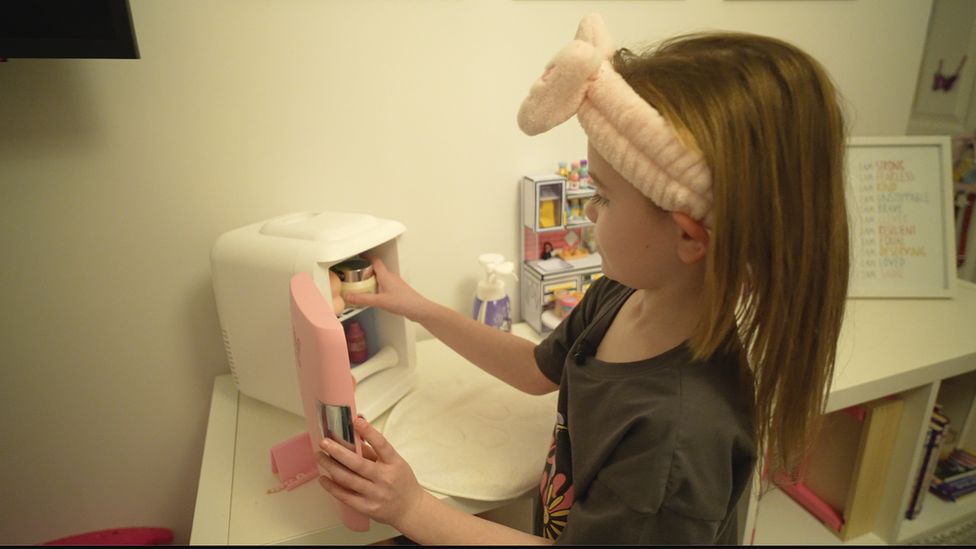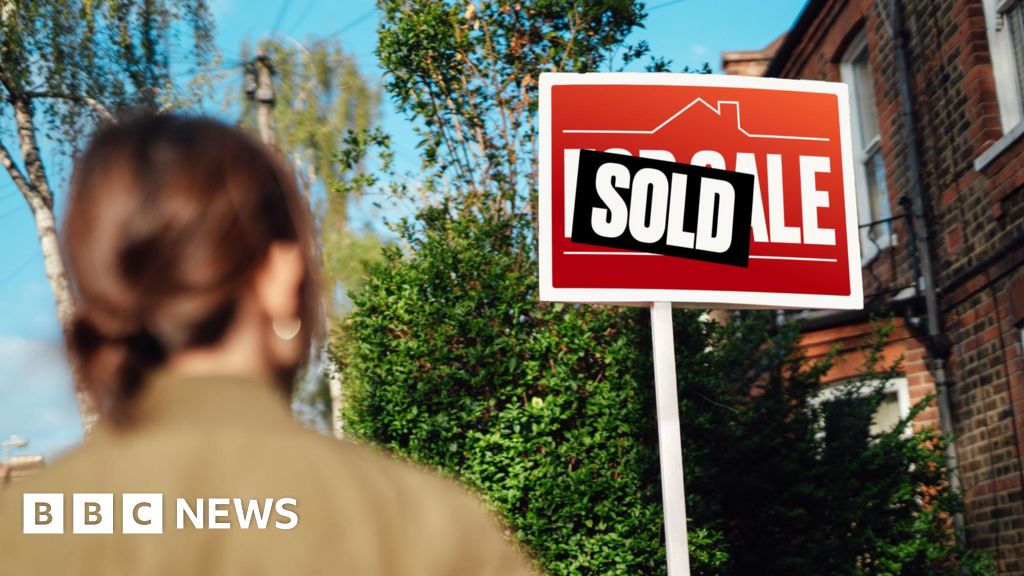ARTICLE AD BOX

Sadie has a fridge for her skincare products
By Annabel Rackham
Health reporter
The growing trend of children as young as eight using skincare products could leave them with irreversible skin problems, the British Association for Dermatologists has warned.
Some children are asking their parents for luxury items after seeing them used by their favourite influencers on platforms such as YouTube and TikTok.
But many of these contain potentially harmful active ingredients intended for adults only, such as exfoliating acids.
They can provoke allergies or eczema.
Eight-year-old Sadie first saw skincare videos on TikTok, where influencers would talk about "how good they were on the skin".
She was particularly attracted to a product from the company Bubble, which "when you push down, comes up in [the shape of] a flower", she tells BBC News, and US brand Drunk Elephant because "she liked the packaging a lot" and it sold everything from lip balms to moisturisers.
Sadie started skincare to fit in with friends at school
BBC News has also received messages from several parents worried about their child's interest in skincare - and the influence of social media and friends.
With its bright colourful packaging and cartoon-animal logo, Drunk Elephant is one of the brands most frequently featured in adult and child influencers' online skincare content.
But many of its bestsellers, which cost about £60 each, contain exfoliators such as alpha and beta hydroxy acids and vitamin-A derivative retinol.
Skincare content is unrestricted on social media and many daily-routine and get-ready-with-me videos attract millions of views.
One skincare YouTuber has collated several from TikTok, showing children using harmful products.
'Stay away'
Other content creators have visited beauty stores - as workers at Sephora and US-based Ulta say children frequently abuse in-store testers and clear shelves of products as soon as they come into stock.
Drunk Elephant in particular has become so popular founder Tiffany Masterson has had to tell "kids and tweens stay away from our more potent products that include acids and retinols" on social media.
"Their skin does not need these ingredients quite yet," she says.
BBC News has approached Drunk Elephant for further comment.
Drunk Elephant's colourful products are popular with children
Fascination with the brand has gone global and seeing her friends had managed to get hold of the products, Sadie "begged" her mother, Lucy, to buy them.
When she refused, realising they were unsuitable, Sadie approached other family members less aware of the potential harm.
But Lucy says the products made Sadie's skin itchy and red - and she had to stop her daughter using them.
"It's really difficult when it's all your child will talk about," Lucy tells BBC News.
"Sadie likes to do [skincare] together with her friends and she feels left out if she's not doing it."
Despite being interested in skincare herself, Lucy had "never heard" of some of the brands Sadie wanted.
Lucy banned Sadie from TikTok, as she was too young for the platform, but many of the content creators she enjoys are still easily accessible on YouTube Shorts.
"Trying to educate her at eight years old about what skincare should be like is really difficult when you've got influencers who she believes more than anyone else," Lucy says.
"She's my youngest child and I didn't think I'd have to worry about her doing skincare and policing skincare at this age.
"It feels like her childhood has now been taken away."
Paediatric dermatologist Dr Tess McPherson says it is important children receive "information, not misinformation" about skincare.
"[A lot of] these are anti-ageing products," she tells BBC News.
"They may be suitable for older skin - they are not suitable for children.
"They can cause irritation to skin whatever age you are - but clearly for younger skin, they can be potentially dangerous or problematic.
"For a child with eczema or sensitive skin, they could cause significant problems.
"And a lot of them will be highly fragrant and they could get contact allergies to some of those products."
Dr McPherson, who represents the British Association of Dermatologists, also worries about the "suggestive packaging", often bright and colourful and therefore attractive to children.
"These products are sold as empowerment but [it] is playing on vulnerabilities," she says.
Parents wanting to address their children's skin concerns should speak to a doctor or dermatologist to "get effective treatments", Dr McPherson adds.
Dermatologist Dr Tess McPherson says children need to stay away from anti-ageing products such as retinol
"You don't need to spend lots of money on expensive products and there's no point seeking out perfect skin, which we know doesn't exist".
There are no age restrictions on buying these items in shops or online.
BBC News approached a number of retailers in the UK stocking skincare brands popular with children.
A Boots representative said it was rolling out "additional training" for its 2,500 in-store beauty specialists, which "included specific information for younger customers and their parents".

 11 months ago
71
11 months ago
71








 English (US) ·
English (US) ·